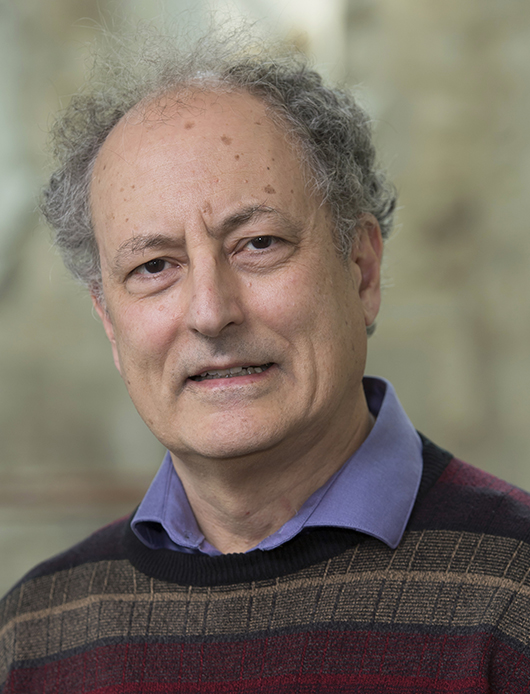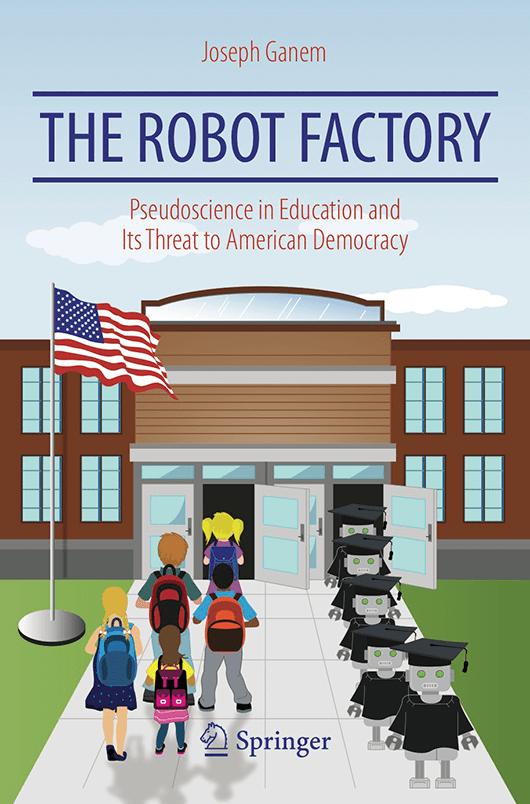Taking a stand for education
Physics Professor Joseph Ganem, Ph.D., discusses pseudoscience in K-12 education

Joseph Ganem, Ph.D., professor of physics, has taught at Loyola for more than 20 years and has served as the physics department chair. He earned a bachelor’s degree in physics from the University of Rochester, a master’s degree in physics from the University of Wisconsin, and a Ph.D. in physics from the Washington University (St. Louis). His research includes condensed matter physics, laser spectroscopy, and nuclear magnetic resonance. Ganem is an award-winning author, writing numerous scientific papers and books.
Ganem shared details about his recent book, The Robot Factory: Pseudoscience in Education and Its Threat to American Democracy, with Loyola magazine.
What is your vision for education?
Schools are busy preparing students for an economy that no longer exists, not the future one that lies ahead. Change is happening faster than any list of standards can accommodate. An education focused on college and career readiness will be obsolete before it begins. Education needs to become change-focused. We need to meet students wherever they are and build on their backgrounds. The economic needs of the future are unimaginable. We do know that we will need people with a wide diversity of talents and interests, and they will need to be flexible and adaptable in order to deal with accelerating global change.
How did you become interested in this particular issue/topic?
I began writing about education issues about 10 years ago. My initial motivation was to call for change in math education at the K-12 level. Because I teach physics at the college level, the lack of mathematics preparedness for my students directly impacts my work. My first commentaries on math became some of my most viral pieces of writing, which led to speaking invitations and requests for more of my opinions on education issues. Because of my writings on education, I was even appointed by the Maryland State School Superintendent to a three-year term on a state advisory board for gifted and talented education.
Why are so many smart, educated people swayed by what you call pseudoscience?
As I explain in the book, in K-12 education, science and the foundational subject of math are not taught properly. The practice of raising math standards at the K-12 level in order to increase achievement has actually resulted in more students arriving at college in need of remedial math. Making math problems at the K-12 level harder does not lead to a better understanding of math; it just frustrates students. Science education has become focused on memorizing facts and obtaining a scientific skill set, but not on how scientists actually think, formulate questions, and go about their work.
Do you think this is a conversation that parents are focused on?
Parents need to join this conversation because public education is essential to our democracy and societal well-being. The dehumanization of education is resulting in a passive and unengaged citizenry. We are already seeing the consequences: great damage to our societal institutions and a failure to collectively solve communal problems. We need authentic education in our schools—not job training. Not only is authentic education essential to combating the existential challenges we face in our political, social, and natural environments, it is the only way to move forward.
Do you share your opinions on education with your students? If so, what are their reactions?
I don’t talk much about education policy in the classroom with my students, but I do teach math and science and I hope to counter many false beliefs and misunderstandings students have of these disciplines. For the past two years I have taught an Integrated Science course restricted to elementary education majors. My goal in this course is to teach students how science actually works and to reduce the fear of science that many non-science majors have.
What are some of the best comments/feedback you've received on your book?
My book resonates strongly with teachers. Some teachers I have heard from said the book was spot on and enlightened them. It reminded them of their teaching careers. One Maryland teacher from a nearby county said, “Now I have your words to back me up when I argue against misguided, “data-driven” approaches to education in Montgomery County schools... You put your finger right on the problem: education should give individuals so much more than mere economic utility.”
Is there anything else you’d like to share with our readers?
At Loyola, I am not training future workers; I am educating future leaders. To learn, lead, and serve in a diverse and changing world requires a well-rounded liberal arts education. Loyola alumni model this truth, and many are willing to attest to it as well. The constant criticism of the liberal arts has steered many students away and endangered many liberal arts programs and colleges. Loyola alumni are living examples of the timeless value of a liberal arts education.

Learn more about The Robot Factory: Pseudoscience in Education and Its Threat to American Democracy, by Joseph Ganem.